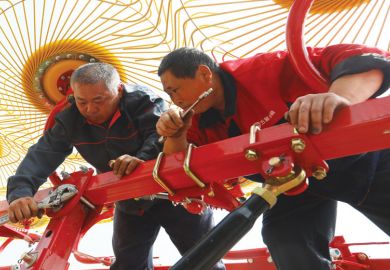New journals provide opportunities for contributors to obtain academic respectability and to earn points in the research assessment of their institutions. Readers these days tend not to subscribe to nor read a certain set of journals, but rather search the web to find papers of relevance or interest to their research or wider interests that they can access online and preferably download for deeper study. Too few by far find time to browse library shelves to survey new titles.
Only nine of the 24 contributions read by this reviewer include the word "sustainable" or "sustainability" in their titles. This may be because many of the papers in the first four issues only introduce the "S" words or concepts in ways that, frankly, seem rather artificial.
Nevertheless, this journal contains many interesting papers reporting surveys or case studies or new approaches to extension work that relate to sustainability in one or more of its many alternative meanings and implications. To this extent the new journal is highly beneficial. It deserves to be made widely available in all institutions concerned with rural economics and "development". But it must also be read as well as shelved.
The first volume sets out the pitch in its editorial board for the journal's purpose: "Preference will be given to articles that have solid empirical foundations, since we believe that sustainability is not a matter of conjecture." This follows, however, the statement of belief that "we know that real progress can only come from a synthesis of the best knowledge and practice of the past, eliminating whatever causes damage to environments and human health, with the best knowledge and technology available to us today". One might perhaps unkindly suggest that both the best practice of the past and also the best knowledge available to us today are both matters of conjecture. Herein perhaps lies the fundamental problem of judging and, worse still, attempting to quantify sustainability. Is it in fact something quantifiable, implied by the editors' use of "empirical", and hence scientifically respectable in the judgement of some, or is it more historical or philosophical, and able to be judged accepting a large measure of subjectivity?
Historically, it is relatively easy to recognise aspects of agriculture of the past that have not been sustained. The journal sets out to include publications "on what is not sustainable about current and past agricultural and food systems". That will be invaluable if enough planners become willing to try seriously to learn lessons from past failures or losses of sustainability. In this regard, a particularly interesting paper is the one by Michael Turner, John Beckett and Bethanie Alton in the first volume, which discusses the apparent sustainability of open-field farming in England for self-sustaining rural populations that inevitably became unsustainable in the face of the development of the many aspects of the market economy. There is a powerful implication here that there may be a fundamental contradiction between what is widely understood as the desirability of "economic development" within the modern global market system and the "sustainability" of agriculture that has become a politically recognised goal, particularly since publication of the report Our Common Future: World Commission on Environment and Development (1987), better known as the Brundtland Report.
There is scope for re-examining horror stories such as the Tanganyika (now Tanzania) groundnut project, The Gambia egg scheme, Uganda's group farming projects and the well-intentioned but fateful introduction of the cassava green mite to Africa that, at a single false step of intending to do good, undid many decades of successfully sustaining food resources by provision of a locust-resistant famine reserve crop in much of sub-Saharan agriculture. There is not so far much evidence of the journal's authors documenting and daring to analyse such relatively recent horrors in the hope of discouraging further ones.
The difference between economic and financial analysis used to occupy many long hours of my own and others' time in evaluating the "bankability" of projects for funding by large international donors. Economists on these teams clearly distinguished economics (management of resources) from accountancy-inspired financial analysis. In many of the papers these questions arise, but without this distinction being articulated, of how and if the potentially beneficial externalities beyond a coherent and hence limited financial model can be quantified. It is these matters that are increasingly recognised as the parameters of sustainability.
The most remarkable paper so far must be that by Norman Uphoff of Cornell University, one of the associate editors. If his presentation of the system for rice intensification proves soundly based, he will have up-ended many years of green revolutionary rhetoric.
Colin Leakey is an applied biologist who worked in Uganda from 1961-73 and has been a consultant to many teams planning for the use of development funds in tropical countries.
International Journal of Agricultural Sustainability
Editor - Jules Pretty
Publisher - Channel View Publications, three issues a year, multilingual-matters.com
Price - Institutions £145.00, Individuals £55.00
ISSN - 1473 5903
Register to continue
Why register?
- Registration is free and only takes a moment
- Once registered, you can read 3 articles a month
- Sign up for our newsletter
Subscribe
Or subscribe for unlimited access to:
- Unlimited access to news, views, insights & reviews
- Digital editions
- Digital access to THE’s university and college rankings analysis
Already registered or a current subscriber?



